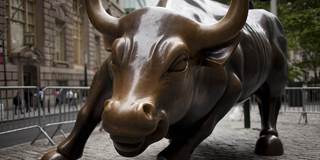There is little disagreement that the immediate response to the 2008 financial crisis averted another Great Depression. But whether the safeguards in place today are enough to prevent a similar large-scale disaster remains an open question.
SANTA BARBARA – Just over a decade ago, on August 9, 2007, the French bank BNP Paribas limited investors’ access to three of its money market funds, worth a total of around $2.2 billion. The BNP freeze was unprecedented, but it received little attention outside the financial world at the time.
It would later prove to be the canary in the coal mine. In the months that followed, payment systems and capital markets seized up everywhere, and the global financial system narrowly avoided total collapse. By late 2008, the world was facing the worst economic crisis since the Great Depression.
Even after a decade and as the US Federal Reserve, the Bank of England, and the European Central Bank begin to normalize interest rates and move away from the extraordinary policies (quantitative easing in particular) used to confront the crisis, we are still trying to decide what lessons to draw from that near-death experience. And while much has been done to reduce the risk of a repeat performance, a critical question remains: Are we safer now than we were ten years ago?

SANTA BARBARA – Just over a decade ago, on August 9, 2007, the French bank BNP Paribas limited investors’ access to three of its money market funds, worth a total of around $2.2 billion. The BNP freeze was unprecedented, but it received little attention outside the financial world at the time.
It would later prove to be the canary in the coal mine. In the months that followed, payment systems and capital markets seized up everywhere, and the global financial system narrowly avoided total collapse. By late 2008, the world was facing the worst economic crisis since the Great Depression.
Even after a decade and as the US Federal Reserve, the Bank of England, and the European Central Bank begin to normalize interest rates and move away from the extraordinary policies (quantitative easing in particular) used to confront the crisis, we are still trying to decide what lessons to draw from that near-death experience. And while much has been done to reduce the risk of a repeat performance, a critical question remains: Are we safer now than we were ten years ago?